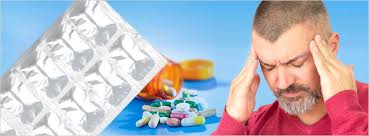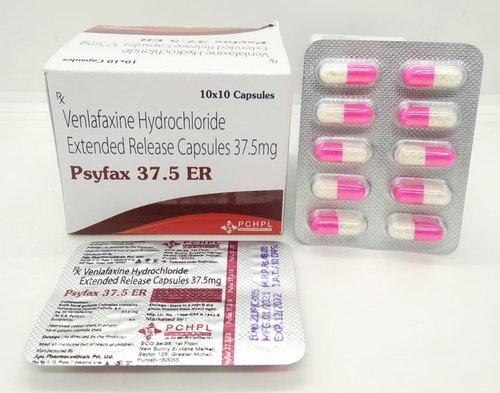Venlafaxine is a type of antidepressant that belongs to the group of drugs called serotonin-norepinephrine reuptake inhibitors. These are often abbreviated SNRIs, and they work by preventing the reabsorption of serotonin and norepinephrine in your brain. Some people use venlafaxine for other purposes besides depression, such as to help with anxiety or pain management. If your doctor has prescribed this medication but you don’t know what it does or how long it takes for it to work, read on!
More on Venlafaxine

Venlafaxine was first patented in 1985 and approved for medical use by the FDA in 1993. It is most frequently prescribed to treat depression, but it may also be used for anxiety or pain management purposes. This medication can take anywhere from four days up to two weeks before you begin experiencing any benefits of treatment; however, this time frame may vary depending on your circumstances.
Venlafaxine is a brand-name medication that contains the generic drug called “venlafaxine hydrochloride”. This means Venlafaxine is the same as other medications. They are not different. Other names for it are Effexor and Evans.
How does Venlafaxine work?
Venlafaxine inhibits the reabsorption of serotonin and norepinephrine in your brain. This helps to increase the levels of these neurotransmitters, which can improve mood and alleviate certain symptoms related to depression. Venlafaxine also has some slight anti-anxiety effects, likely due to its action on serotonin levels. Finally, I want to mention that venlafaxine can reduce pain. We don’t know how this works yet, but it does. It’s worth mentioning because people might not know about it.
Directions Of Use

You can take Venlafaxine with or without food. You must take this for the amount of time that your doctor prescribes. It is important to do what is right for you. This is hard. You can’t change what you are taking (dosage). It depends on how you are feeling or if you have any other health conditions. If any additional side effects occur while taking venlafaxine, be sure to contact your doctor.
Venlafaxine is not recommended for use during pregnancy, as it has been linked with birth defects. It is also important to avoid breastfeeding while taking this medication. It can pass into breast milk and harm the baby nursing from you. If you become pregnant or stop breastfeeding while taking this medicine, talk to your doctor about what to do.
Potential Side Effects Of Venlafaxine
Like all medications, venlafaxine can cause some side effects. The most common ones include:
- Nausea or vomiting
- Dry mouth
- Constipation
- Headache
- Insomnia
- Anxiety or nervousness
- Irritability
- Sexual problems
When should I expect to see improvement in my symptoms?
Venlafaxine can take anywhere from four days to two weeks before you begin experiencing any benefits of treatment. This time frame may vary depending on your circumstances. Some people find that Venlafaxine works very quickly and they start feeling better within a few days. Other people may need a bit more time for the medication to start working. If you don’t see any improvement in two weeks, talk to your doctor about getting a higher dose or trying a different medicine.
Precautions that should be taken

It’s important to remember that even if you are experiencing some relief of your symptoms, it may not be due to the venlafaxine. You should speak with your doctor before making any changes in dosage or stopping treatment entirely.
Venlafaxine is primarily metabolized using hepatic metabolism via cytochrome P450 isoenzyme CYP450. Some drugs can affect how much venlafaxine is in your system. So tell your doctor about all the medicines you are taking, including prescription and over-the-counter ones.
Venlafaxine should not be taken by people with kidney or liver disease, such as cirrhosis. It should also not be taken by women who are breastfeeding or pregnant.
Can I take this medication with other medications?
- It’s important to remember that even if you are experiencing some relief of your symptoms, it may not be due to the venlafaxine. You should speak with your doctor before making any changes in dosage or stopping treatment entirely.
- Venlafaxine is primarily metabolized using hepatic metabolism via cytochrome P450 isoenzyme CYP450. Drugs that stop or start the body’s enzyme can change the level of medicine in your system. You may need to tell your doctor if you take any medications, including over-the-counter ones.
- People should not take Venlafaxine with kidney or liver disease, such as cirrhosis. Women who are breastfeeding or pregnant should not take the medicine too.
Withdrawal
It is important to remember that even if you are experiencing some relief of your symptoms, it may not be due to the venlafaxine. You should speak with your doctor before making any changes in dosage or stopping treatment entirely.
Venlafaxine can cause withdrawal effects when people suddenly stop taking this medication after being on it for a while. Symptoms of withdrawal can include:
- Dizziness
- Nausea
- Vomiting

- Headache
- Confusion
- Anxiety
- Depression
If you experience any of these symptoms, talk to your doctor about how to safely stop taking venlafaxine. You mustn’t stop taking it abruptly.
Is Venlafaxine addictive?
Venlafaxine can be habit-forming, which means you could become dependent on the medication if you take it for an extended period. This is especially true when people stop taking their medications suddenly or miss a dose because they are trying to overcome addiction issues. If you consume venlafaxine for an extended period, it could become habit-forming. Even if you follow your doctor’s dosing instructions carefully, there are still risks with taking this medicine long-term.
Conclusion
The increased popularity of venlafaxine leads to the question if we should be worried about this increasing dependence on antidepressants. As with any medication, patients and doctors need to use caution when taking these drugs to avoid dependency. Patients should consult their physicians before discontinuing treatment due to side effects or withdrawal symptoms such as anxiety, panic attacks, insomnia, and nausea. It’s also helpful for people considering starting a new antidepressant drug like this may want to know how long they can expect relief from depression symptoms while using the medicine and what other medications work best in conjunction with an SSRI (selective serotonin reuptake inhibitor) like Venlafaxine. Always remember that there are many different treatment options and lifestyle changes that can help with alleviating depression symptoms, so it’s important to discuss all options available with your doctor.
If you are looking for affordable Online Counseling MantraCare can help: Book a trial therapy session



